Patrick Decker became Xylem’s CEO in 2014. At the time, the company was a renowned product supplier in the Water Industry. Yet under its lead, Xylem further expanded to become a solution provider fostering and nurturing its surrounding ecosystem.
Patrick was kind enough to spend some time with me to review some of the hot topics in our sector, yet he was awaited on stage for a speech, so we had to be fast. Yet it was such as pleasant experience (as you’ll discover) that I’ll make sure to bother him a bit to back for a deeper dive!
with 🎙️ Patrick Decker – CEO at Xylem
💧 Xylem is one of the largest water and wastewater technology companies globally and follows the simple motto: “Let’s solve water.”
This episode is part of my Series on the Water Crisis in America
What we covered:
3️⃣ The 3 obstacles to Water Technologies’ Adoption…
🤐 … and the 3 secrets to overcoming them
💪 The multifaceted perks of Private-Public Partnerships that lead to win-win-win-win-wins
🙌 The one-billion eyeballs campaign that placed Water Challenges on the map for hundreds of millions of people
💙 Patrick’s KPI, Water Infrastructure, Allocation of Funding, Youth Engagement… and much more!
🔥 … and of course, we concluded with the 𝙧𝙖𝙥𝙞𝙙 𝙛𝙞𝙧𝙚 𝙦𝙪𝙚𝙨𝙩𝙞𝙤𝙣𝙨 🔥
Resources:
➡️ Send your warm regards to Patrick on LinkedIn.
➡️ Check Xylem’s website
➡️ A big THANK YOU to Sciens Water for enabling this episode!

is on Linkedin ➡️
Infographic: Patrick Decker’s Interview in a nutshell
Infographic-Patrick-Decker-XylemTeaser 1 – How Patrick Decker intends to Empower Youth to Take Action
Teaser 2 – Water is an Industrial Risk we don’t mention enough
Teaser 3 – Sustainability is the opportunity of a Lifetime, not only for Xylem
Teaser 4 – How Xylem evolved from a pump company to a solution provider under Patrick Decker’s lead
Full Video: My conversation with Patrick Decker
Table of contents
- What we covered:
- Resources:
- Infographic: Patrick Decker’s Interview in a nutshell
- Teaser 1 – How Patrick Decker intends to Empower Youth to Take Action
- Teaser 2 – Water is an Industrial Risk we don’t mention enough
- Teaser 3 – Sustainability is the opportunity of a Lifetime, not only for Xylem
- Teaser 4 – How Xylem evolved from a pump company to a solution provider under Patrick Decker’s lead
- Full Video: My conversation with Patrick Decker
- Full Transcript:
- Our Water Infrastructure is not Expensive
- The 3 obstacles to water technologies’ adoption
- On Patrick Decker’s call, Xylem walks the talk!
- Trust and Communication are the keys to Water Technology Adoption
- Under Patrick Decker’s lead, Xylem has been on a transformational journey
- Private Public Partnerships bring the conversation far beyond just investment
- The KPI that will tell Patrick Decker he succeeded as Xylem’s leader
- Rapid Fire Question
- Other Episodes:
Full Transcript:
These are computer-generated, so expect some typos 🙂
Antoine Walter: Hi Patrick, welcome to the show.
Patrick Decker: Hi, good morning.
Antoine Walter: I’m honored to speak with you. You have been on my “guests bucket list” for a while, so I’m happy that this day finally happened!
Patrick Decker: Well, thank you!
Antoine Walter: I’m wondering, what’s Xylem’s take on that challenging question of how do we have to rethink water?
Our Water Infrastructure is not Expensive
Patrick Decker: The biggest rethink in water is around the affordability of addressing our water infrastructure challenges around the World.
I think that there’s still an impression that it’s really expensive. Where’s the money gonna come from? How do we address access to water while also addressing the equity around the cost of water? Both at a macroeconomic level, at a community level, and also at a household level. These are real challenges, no doubt, that are not easy to address.
But the technologies and solutions do exist today to be able to address our water challenges at an affordable level!
Water Challenges exist: and so do solutions!
I also think the new rethink is that we’ve always talked about the importance of creating awareness of the big water challenges around the world.
Due to unfortunate climate change related events and other disasters, aging infrastructure, you know, that intersection of aging infrastructure and climate is creating a level of unprecedented awareness around the world.
But we need to move people beyond fear because fear paralyzes them. It causes political division, and we do not need that at this point in time, but we need more education around affordability.
The 3 obstacles to water technologies’ adoption
Antoine Walter: So if technologies exist, what are we waiting to implement those?
Patrick Decker: Again, I think one is awareness. I think two is utilities around the world or city works departments, depending upon who owns certain aspects of that water, distribution network, or the treatment plants. These are highly dedicated civil servants. They wake up every morning thinking about how are they gonna provide safe, clean drinking water at an affordable level?
How are they gonna manage the impact of stormwater overflow in our communities? They’re thinking about this all the time. These are hard jobs they have.
By definition, many of them are risk averse. Because there’s not always a lot of upside in taking chances with the water supply. And so part of this, it takes time for them to be able to do pilots, to prove out the pilots or to see other utilities that have been successful that look more like them, that have taken on some of these different alternatives of investments.
The untold third one: the role of Businesses
I think the other piece of this is we don’t talk as much about the impact of water scarcity on businesses. And the cost of water to a business is not the water bill per gallon or liter.
More times than not, it’s the cost of not having access to it. So more and more businesses are operating in water-stressed areas where almost like brownouts on the energy side, they’re actually having water shortages.
So the cost of water to them is the value of lost production and lost economic profits. Therefore, they have to do job reduction or dislocate along the way. This is a part of the sector that has not been talked about a lot in terms of where they can be more active in funding some of this infrastructure.
Not only their own operations but how they get more involved in their own communities and make sure there is equitable access to citizens in and around their community.
Antoine Walter: So you see the role of the industrials as well to be part of the community, and to irradiate around their facilities to also help the community?
Patrick Decker: That’s correct. And to educate!
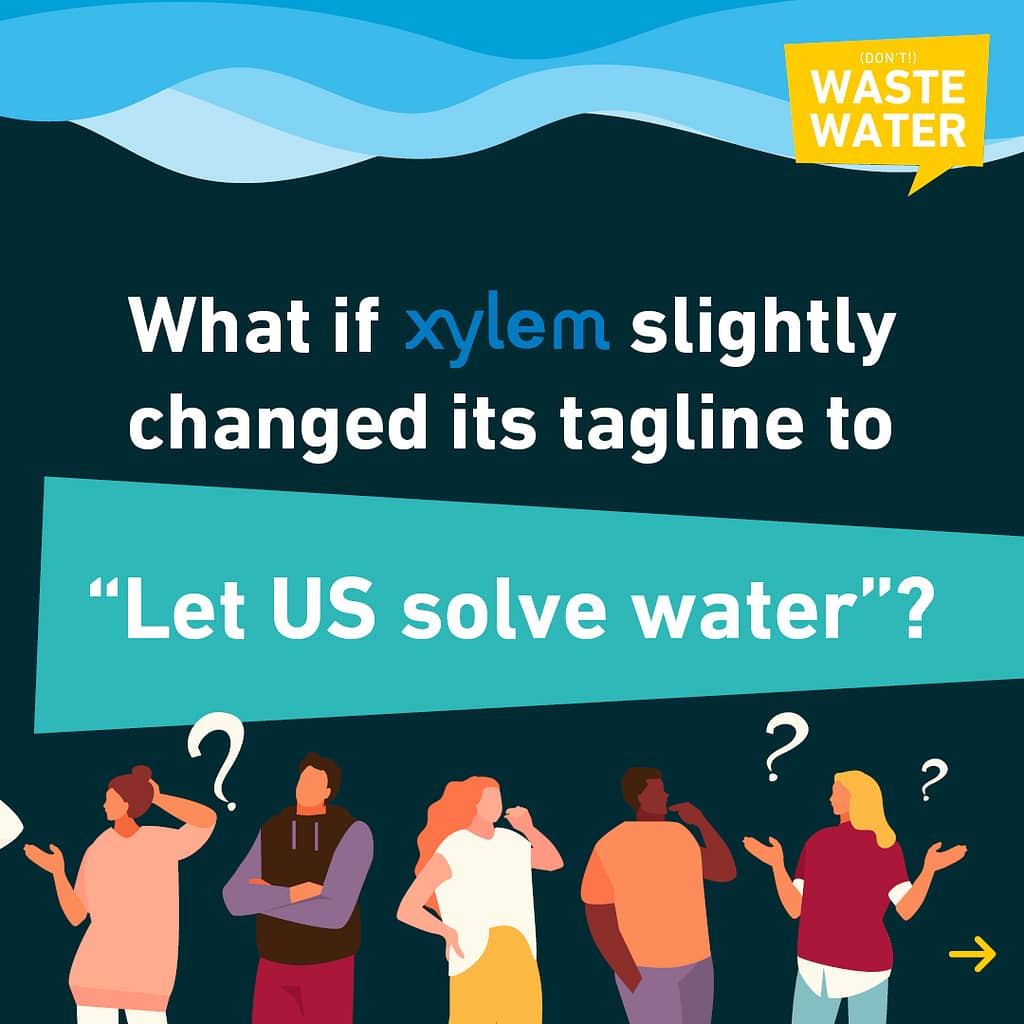
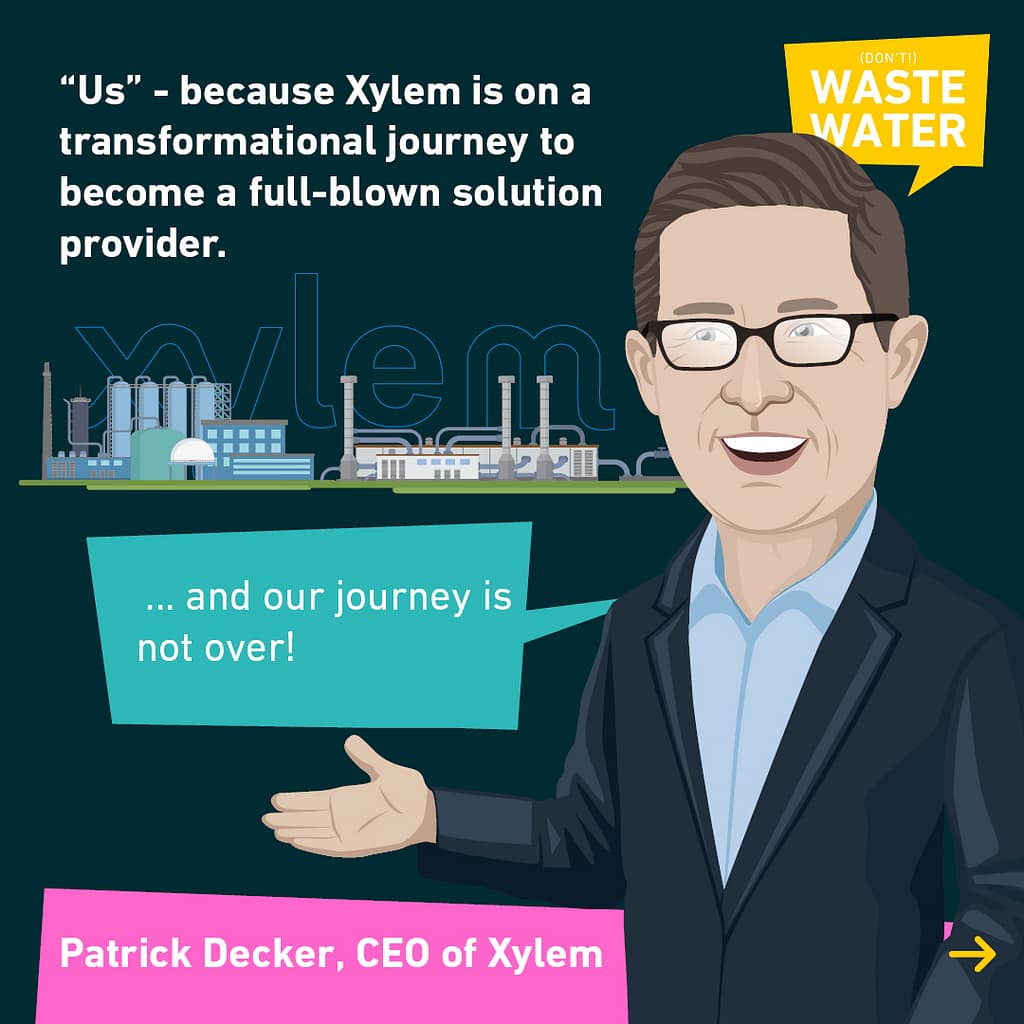
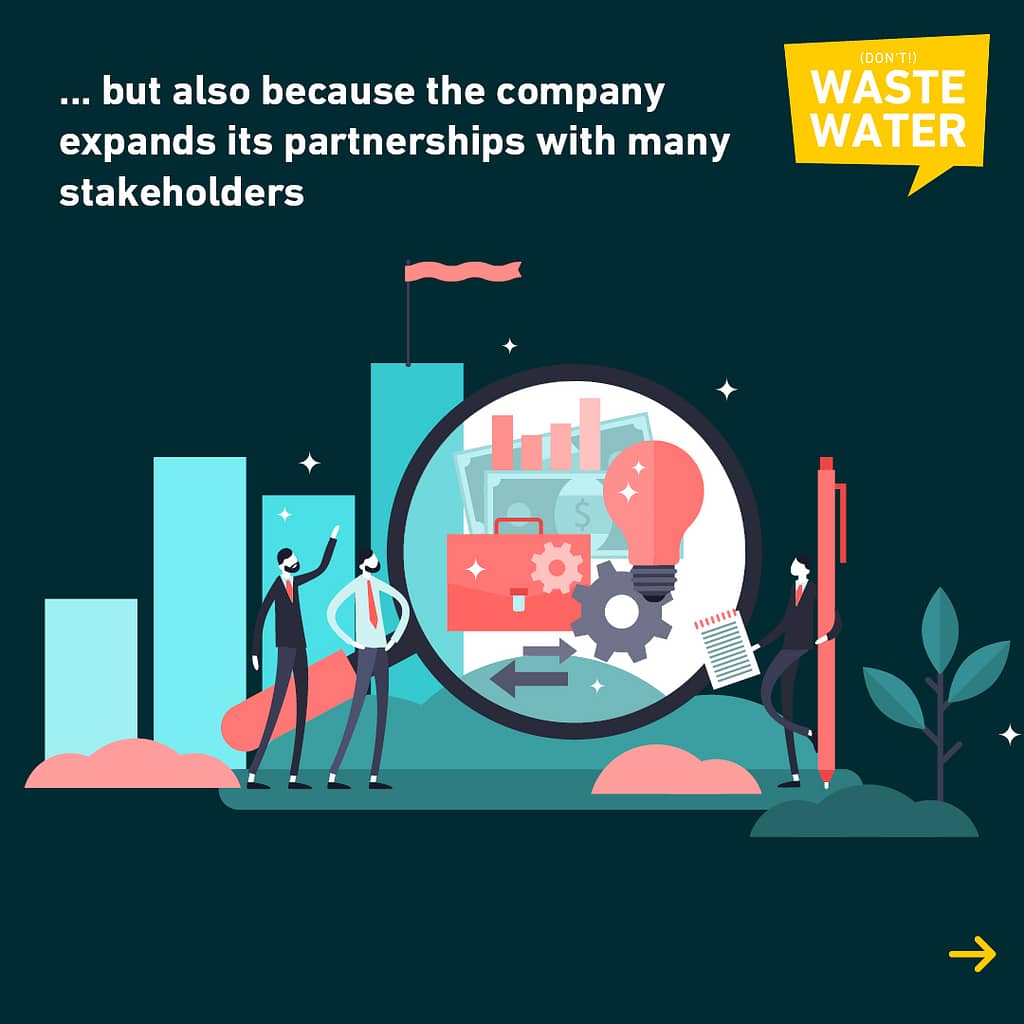
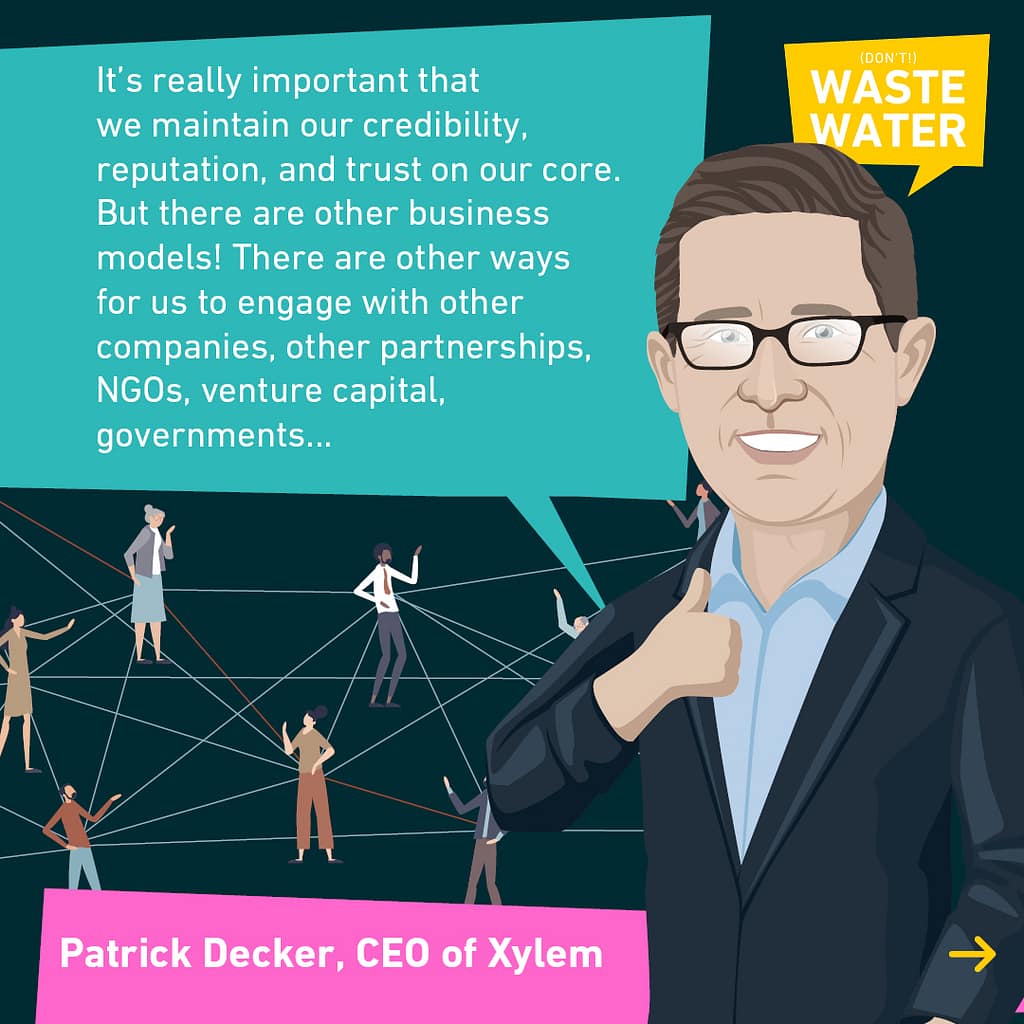
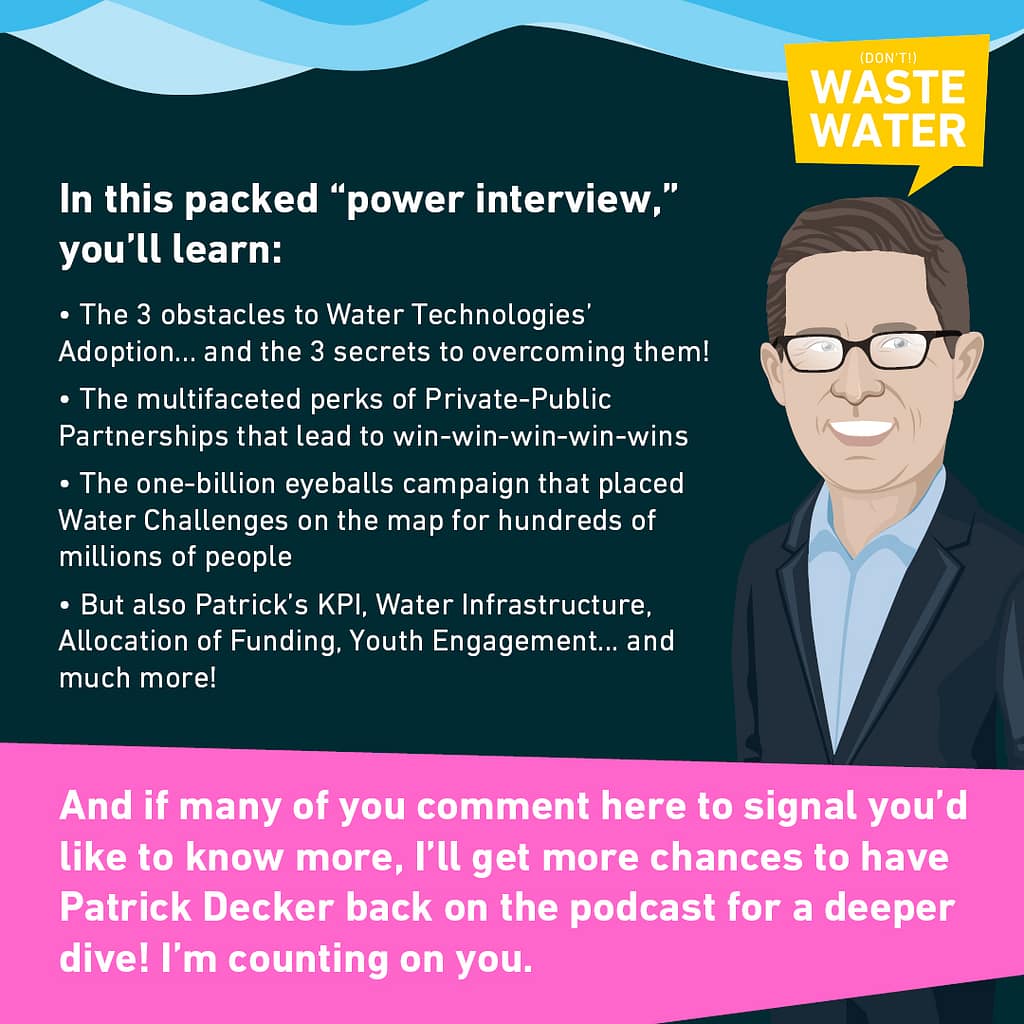
On Patrick Decker’s call, Xylem walks the talk!
Antoine Walter: What’s the role of Xylem in all of that?
Patrick Decker: Well, we are a business. So what I’m saying others should be doing, we’re doing ourselves in terms of our own sustainability commitments and goals. We take great pride in the very aggressive goals that we put out there, both in terms of impact within our own four walls of our operations but also in our handprint.
How do we help customers and communities do a better job at managing their own? Whether it be race-to-zero and carbon neutrality, whether it be businesses that want to be neutral water, from a branding standpoint? We have a role to play in educating and making sure they’re aware that the technologies and solutions exist.
Two more secrets: sharing best practices and engaging new generations
Secondly, our obligation as a technology provider is to always be learning from different applications around the world, sharing those best practices, putting our own capital to work, going out and acquiring new technologies, or investing in those technologies.
But our role also is, you know, we spend a lot of time on youth engagement, creating education and awareness of youth around the World.
Yes, here are the challenges, and yes, here are the opportunities. And we wanna create a movement of young people around the world to say;
Trust and Communication are the keys to Water Technology Adoption
Antoine Walter: So in light of these challenges, which are increasing with climate change, water scarcity, water equality, everything which was addressed in the conference so far. Do you have a special trick to bring the adoption of these technologies to the fast lane? To go faster?
Patrick Decker: I wish I did! Well, I have tried to do it, and we will continue to try to do it.
I think it is getting the word out. It is recognizing that part of the role of a business leader and a business leadership team and an organization is not to remain quiet and on the sideline and focus only on our own economic profits and making our numbers every day.
We have the responsibility to become a platform and to become a voice that we join others around us to be a part of that conversation.
As a CEO, Patrick Decker’s role is to get the Water Word out
And that’s why a meaningful part of my time as a CEO is spent in these kinds of conversations. To just get the word out! But then, at the same time, there’s a lot we have to do to make sure that we continue to build that trust.
Patrick’s not just saying this because it’s gonna lead to higher economic profits for Xylem.
This is the opportunity of a lifetime for us as a society to make a difference. It’s far more than just economic value. It is about creating social value as well.
Under Patrick Decker’s lead, Xylem has been on a transformational journey
Antoine Walter: You mentioned hand print and footprint and how you start by walking your own talk. Is it right to say that Xylem is on a transformational journey?
Maybe 10 years ago, you still were a pump company. You were far more than that, but you were seen by the market like a pump company.
Patrick Decker: Yes.
Antoine Walter: And more and more, you’re a solution provider, and you’re kind of bridging different parts of the industry. Is the journey over?
Patrick Decker: That is correct, but the journey is not over.
We have been on a transformation. We will continue to be on a transformation. And a transformation, not just in terms of what we bring into our portfolio of solutions from a product and technology standpoint. But also how we work in different ways based on our core. We’re never gonna walk away from our core!
Xylem opens up to new business models
It’s really important that we maintain our credibility, reputation, and trust on our core. But there are other business models. There are other ways for us to engage other companies, other partnerships, NGOs, venture capital, governments…
Again, building a platform that people can rally around to say,
No one company or organization can do it on its own. We certainly can’t. But yes, we’re gonna continue to put our capital, both financial and human to work, to build out an even more impactful platform for Xylem.
Private Public Partnerships bring the conversation far beyond just investment
Antoine Walter: One of the red threads of the conversation I’m having today so far is this link between private, public, and also money or finance. So really, the three levels. How do you see that evolving in the next five or ten years? What is the martingale for impact?
Patrick Decker: We are big believers and proponents of that public-private partnership because it’s more than just the financial capital. It’s aligning objectives and measurements of success for a community beyond purely the financial metric.
Multifaceted partners have skin in the game together to drive success. I think that it also reduces oftentimes the noise, the conflict that is based upon legacy or the past rather than fact. And I think it can galvanize! It’s not the solution for everywhere on the planet.
But as you well know, I mean, you are an incredibly seasoned global citizen here in the water discussion.

There are many, many, many examples of success of this around the world. Far more successes by a factor of exponentially than any failures along the way. It doesn’t mean it’s always perfect, but it has proven itself to be a significant alternative. It’s not the only alternative for funding, but it is one.
More of the global infrastructure investment packages should be allocated to water
The second, in my view, is much more federal money, whether it be in the US, whether it be in Europe, whether it be in China, where there are large infrastructure funding discussions happening.
Obviously, I may not be objective, but when I look at the return on investment, both economically and socially, of redirecting more of those dollars to water infrastructure, as a basic human right to have access to it, and the impact it has on the economic value of businesses when they’re facing water stress; I don’t believe that we’re putting enough money that’s already been approved and the overall infrastructure packages. Not enough of that money is being directed toward water.
The KPI that will tell Patrick Decker he succeeded as Xylem’s leader
Antoine Walter: To round off that conversation, because I have to be cautious of your time, what is the key performance indicator that will tell you in five or 10 years that you’ve succeeded, maybe at all? Or simply in doing your part as one of the companies in the water sector?
Patrick Decker: That’s a really good question and a really tough question because it’s hard to narrow it down to just one thing. But I do believe that some measurements around engagement around the world…
1 billion engagements through Xylem’s partnership with the City Football Group
You know, one of the measures that we’re getting right now is the following. We have this partnership with the City Football Group, Manchester City, New York City Football Club, Mumbai, and others.
We now have roughly 1 billion social media impressions over the last four years. And when we did a survey this past year, more than a third of those social media impressions, which are predominantly younger in age, indicated that they have a strong affinity about water challenges and issues and that they’ve taken some action over the last year to do something about it.
That’s a powerful indicator. That is engagement.
Antoine Walter: Incredible!
Patrick Decker: And that’s one that we will continue to measure, but that’s simply one example. I think substantially larger spending in the US on water, especially at the most basic societal level, would be another indicator of success that we’ve gotten the word out.
Antoine Walter: So, as I said, I have to be cautious of the time. I think the conference won’t get going if I don’t free you at some point because you’re the next one on stage.
Well, thank you. I take the last 30 seconds just for one rapid-fire question.
Rapid Fire Question
Antoine Walter: What is the most exciting project you’ve been working on and why?
Patrick Decker: Youth engagement. Creating the ability beyond just Xylem, but those that want to be a part of something larger here on creating the awareness and the empowerment and belief of this next generation of young people that have the enthusiasm, the passion, the knowledge. And we can show them they can have the resources to go make a big difference.
And how we engage other organizations to be a part of that journey with us because it’s the power of the collective. None of us need to be competing for mind share when it comes to water in the mind of our youth.
Antoine Walter: That makes for an. Awesome conclusion. So thanks a lot, and I hope we’ll have more time in the future to go more in-depth!
Patrick Dekker: Thank you!

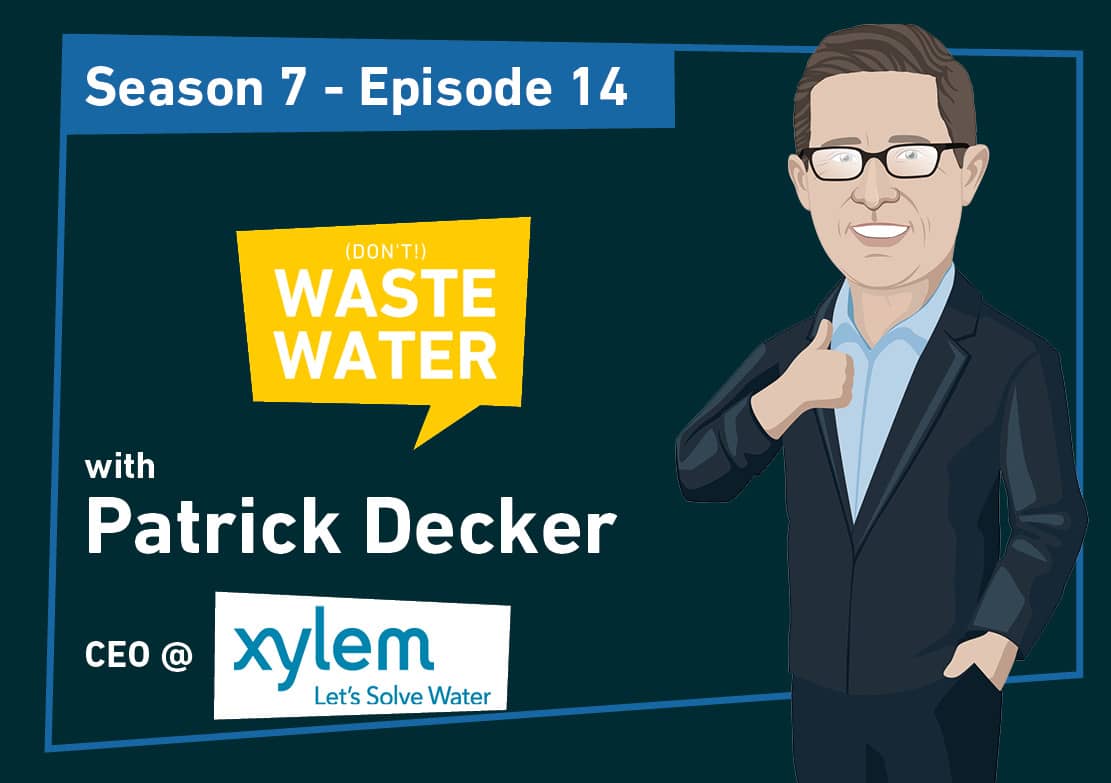











1 thought on “What’s Patrick Decker’s Call To Action? Let Us Solve Water!”